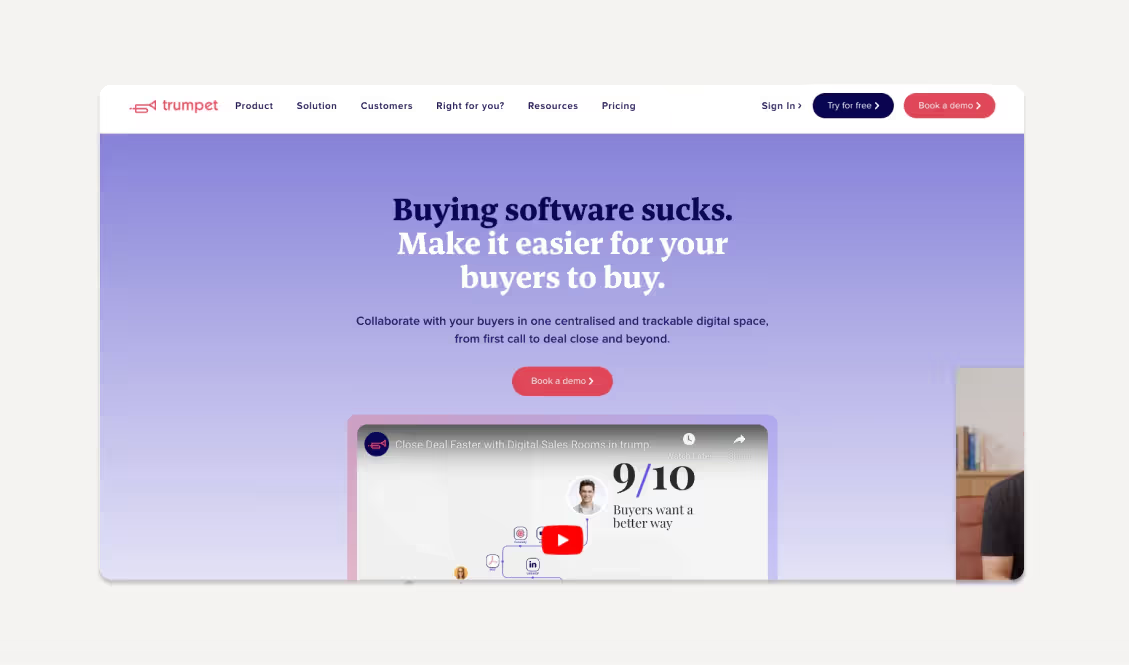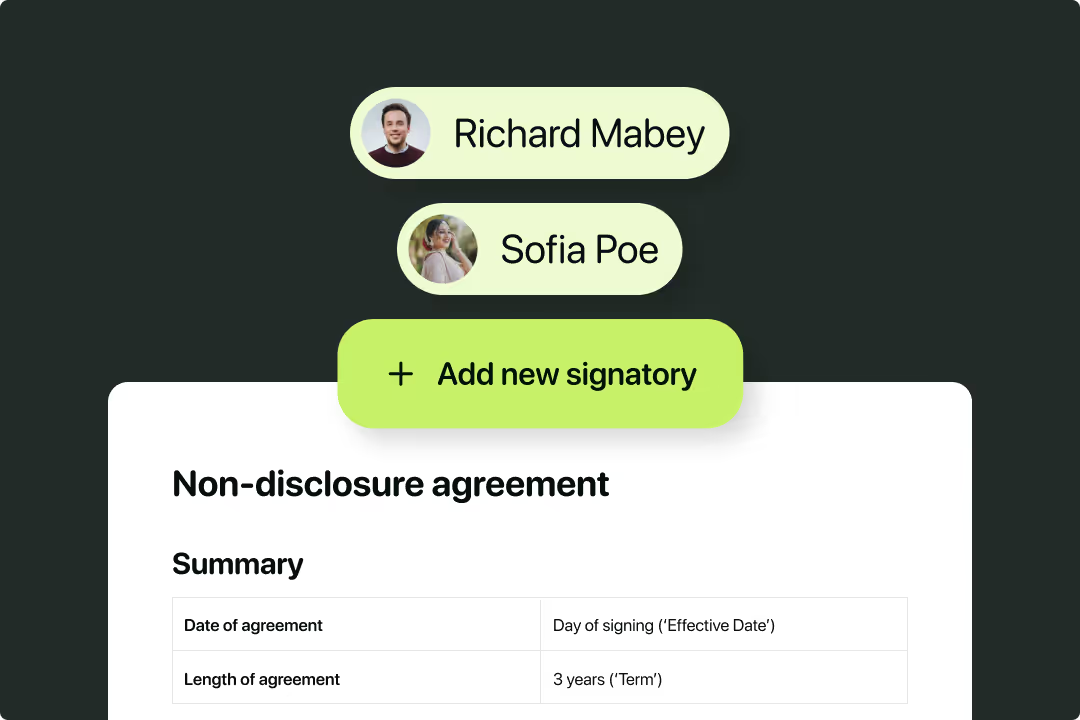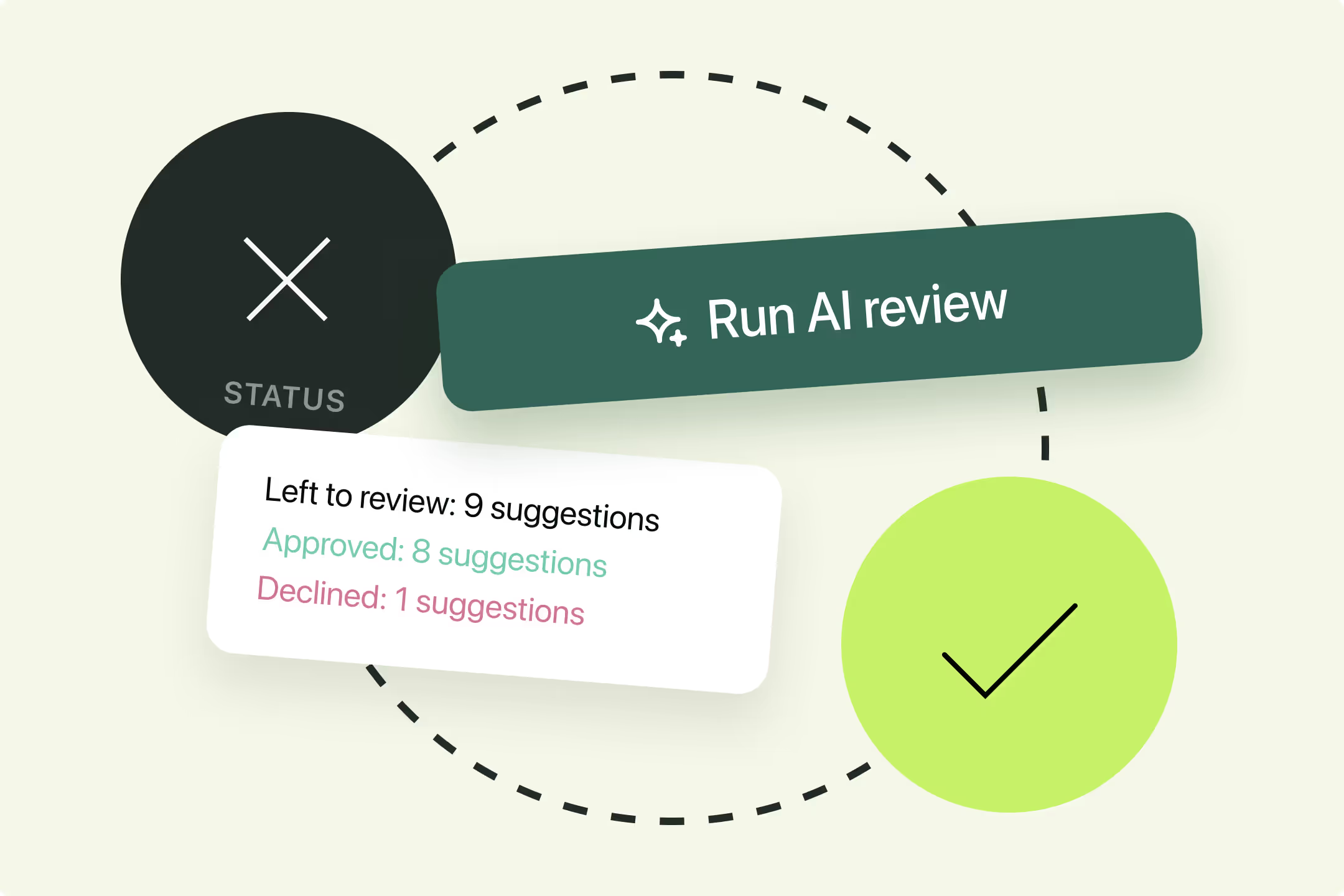Solutions
Customer Support
Resources
The B2B buying journey has evolved significantly in recent years.
Today's buyers spend more time researching independently without the help of sales reps, while an average of 6-10 stakeholders are involved in each purchase decision. This presents sales teams with a challenge: how to deliver the right information, to the right people, at the right time.
Digital sales rooms – dedicated spaces for deal-related content and collaboration – offer a potential solution.
By 2026, Gartner predicts that 30 per cent of all B2B sales cycles will be managed through a digital sales room, transforming how businesses engage with potential customers throughout the deal cycle
This article explores what digital sales rooms are, the benefits of having one, key features to look for in digital sales room software, and how businesses can achieve these same benefits with other tools (like contract automation platforms).
A digital sales room is a secure online space where sales teams collect and share content related to a specific deal. Think of it as a virtual deal room – a single destination that houses everything from product demos and pricing information to contracts and relevant case studies.
The rise of digital sales rooms reflects a fundamental shift in how businesses buy from each other.

Today's B2B buyers spend most of their time researching independently, sharing findings with colleagues, and evaluating options across different teams. Traditional methods of sharing sales content through email attachments and static presentations no longer match this more collaborative reality.
That's why digital sales rooms are increasingly becoming increasingly popular. They give buyers the freedom to explore and evaluate on their own terms, while providing sales and marketing teams with valuable insights into buyer engagement.
When a potential customer visits a digital sales room, they find everything they need to make a decision, organized in a way that makes sense for their buying process.
Modern sales cycles involve multiple stakeholders, complex decisions, and increasing pressure to move quickly.
Digital sales room software addresses these challenges by transforming how buyers and sellers interact throughout the deal process. Let's explore why they've become such a valuable tool for sales organizations.
First, they dramatically improve the buyer experience. Buyers no longer need to chase information across email threads or wait for internal teams to send sales materials. Instead, they can access everything they need in one place. This self-service approach matches how modern businesses prefer to buy. Stakeholders can research and evaluate at their own pace, in their own time.

A digital sales room platform also provides sales teams with greater visibility into the buying process. They reveal which content resonates most strongly and who's involved in the evaluation. These insights help sales teams time their interventions more effectively, focus conversations on what matters most, and spot potential bottlenecks before they slow deals down.
Beyond simply organizing content more effectively, digital sales rooms also strengthen relationships throughout the sales cycle. They create transparency around pricing, implementation, and expected outcomes. They make it easier for technical teams to find detailed specifications and for financial stakeholders to access ROI analysis. This clarity builds trust and accelerates decision-making.
There are several essential features to look for when purchasing digital sales room software.
If you’re considering investing in digital sales room software, here’s a brief rundown of the top five digital sales room platforms to check out.
GetAccept offers an all-in-one platform that combines digital sales rooms, eSignatures, proposal management, and document tracking. It focuses on streamlining the sales process while enhancing buyer engagement with features like personal video messaging and analytics.

GetAccept is rated 4.7 out of 5 overall by users on G2, making it one of the top-rated digital sales room tools on the market. Here's a review from a verified GetAccept user that sums up the tool's functionality well:
“Sharing a Digital Sales Room at the start of a call and being able to follow this through with ongoing content, evaluation plans, files and eventually contract signature allows me to keep close control of deal cycles and save admin time.” - Verified GetAccept user, G2
Allego combines digital sales rooms with content management, collaboration tools, and learning features. Its platform is designed to help sales teams deliver a seamless, interactive buyer journey that aligns all stakeholders.

Allego is rated 4.8 out of 5 by users on G2, which is higher overall than GetAccept. Here's what Allego users have to say about their experience using the platform:
“I have gotten a TON of feedback from prospects that have mentioned how useful the Digital Sales Rooms are and how much it makes us stand out in the sales process. We've been able to tie a strong amount of revenue to the DSRs since implementing Allego.” - Verified Allego user, G2
Aligned is a collaborative platform that helps sales and go-to-market teams manage complex deals and improve buyer engagement. It provides shared digital workspaces where sellers and buyers can collaborate on resources, timelines, and mutual action plans.

Aligned is rated 4.8 out of 5 on G2 by real users, putting it on par with other leading sales room tools like GetAccept and Allego. Here's what one user had too say about Aligned's impact on prospect guidance in particular:
“I absolutely love Aligned! It has received fantastic feedback from both my prospects and my team. The organization of the digital room makes a huge difference in guiding prospects through their journey” - Verified Aligned user, G2
DealHub.io provides a comprehensive platform for creating dynamic digital sales rooms. It focuses on enabling real-time collaboration, content sharing, and streamlined deal management. With full customization and seamless CRM integrations, it offers a personalized buyer experience.
Dealhub is rated 4.7 out of 5 on G2. Users appreciate how seamlessly it integrates with the rest of their sales tech stack, leaving reviews like the following:
“We get very good visibility on our buyer journey which allows us to get the right decisions along the way. At any time, we know what is necessary to progress the deal or close it” - Verified DealHub.io user, G2

Trumpet enables sales teams to create customized digital sales rooms, known as "Pods," tailored to each prospect. These Pods centralize all sales materials, enhance collaboration, and provide insights into buyer engagement, helping sales reps close deals faster.

“The best part of the solution is its ease of use and branding customisation. Its ability to seamlessly integrate with other sales tools, such as Loom, Gong, and Calendly, is impressive" - Verified Trumpet user, G2
While digital sales rooms offer powerful capabilities, they're not the only way to create engaging buying experiences.
Many businesses achieve similar results with alternative tools and platforms. The key lies in understanding what truly matters to buyers: easy access to information via digital channels, transparent communication, and smooth collaboration throughout the deal process.
For example, contract management systems like Juro deliver many of the same benefits. They provide secure spaces where buyers and sellers collaborate on agreements, share important documents, and track deal progress.

Key documents are centralized and accessible, making it easy for legal teams to review terms or sales teams to check pricing details. The best platforms even offer analytics that help teams understand engagement patterns and optimize their processes.
However, remember: What matters most isn't the specific tool you use, but how well it supports your buyers' needs. Regardless of the tools they use, successful teams focus on creating experiences that make it easy for buyers to evaluate, decide, and move forward confidently.
While Juro's contract management platform isn't a digital sales room, it addresses many of the same challenges that make digital sales rooms valuable.
Like a digital sales room, Juro creates a centralized, secure space to boost sales and legal teams collaboration throughout the buying process.
The difference? Juro focuses specifically on streamlining the contract stage – often the most crucial (and complicated) part of any deal.
{{quote1}}
Juro's collaborative workspace transforms how teams handle contracts. Sales teams can use Juro's templates to instantly generate contracts without needing legal's help.
For example, according to Paddle: “It takes the sales team four clicks to generate and approve a contract in Juro”.
During the negotiation stage, sales teams, legal departments, and external stakeholders all work together in real time using just one platform.
{{quote2}}
When a buyer needs to review terms or suggest changes, they access a single, always-up-to-date version rather than hunting through email threads.
With Juro, teams see exactly where each contract stands, who needs to take action, and can track when key milestones (like renewal dates) are approaching. This transparency helps prevent delays and keeps deals moving forward.
Meanwhile, Juro's legal AI accelerates the process further by helping teams draft and review contracts more efficiently while maintaining compliance.

The result mirrors what digital sales rooms aim to achieve: smoother, more efficient sales processes. But don't just take our word for it – Juro customers report saving 72 hours per month and reduce contract touchpoints by up to 8,000 per year.
Looking to unlock similar benefits for your business? Fill in the form below to speak to a specialist about Juro. Alternatively, you can check out this guide to sales contract management software.

Lorem ipsum dolor sit amet, consectetur adipiscing elit. Suspendisse varius enim in eros elementum tristique. Duis cursus, mi quis viverra ornare, eros dolor interdum nulla, ut commodo diam libero vitae erat. Aenean faucibus nibh et justo cursus id rutrum lorem imperdiet. Nunc ut sem vitae risus tristique posuere.

